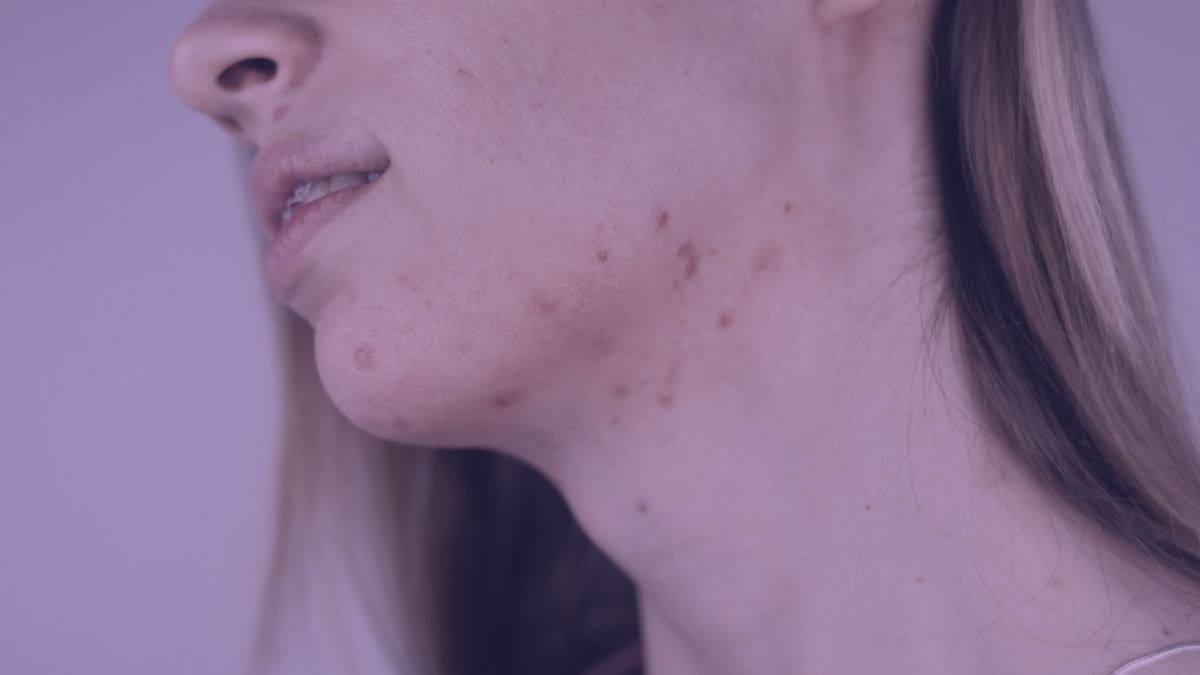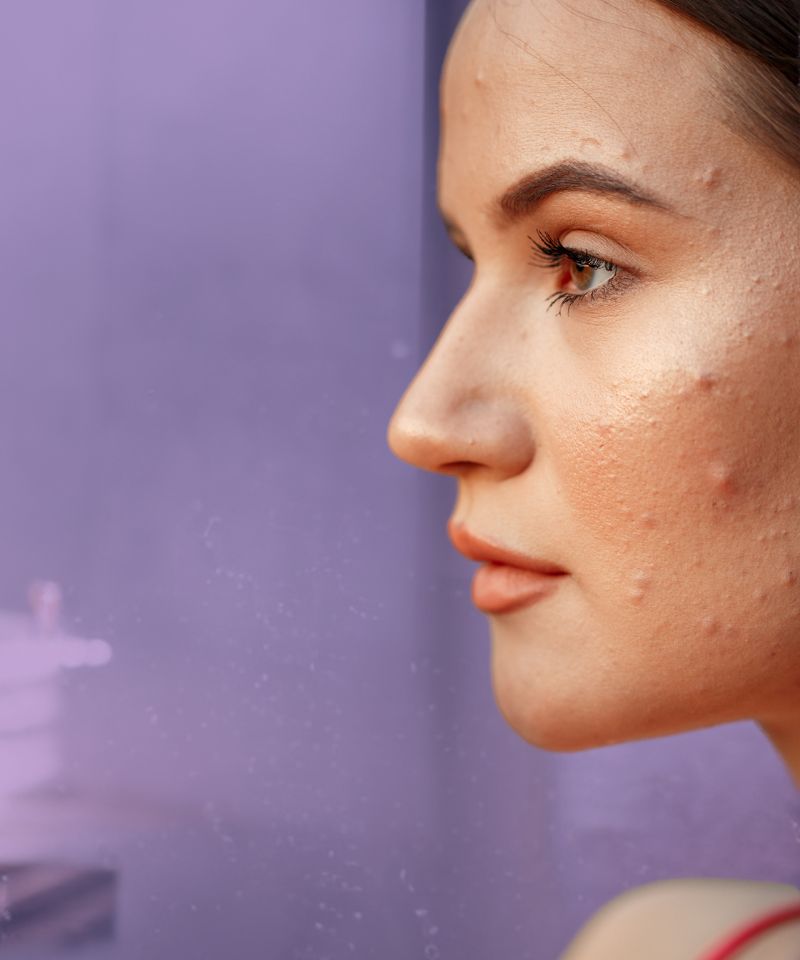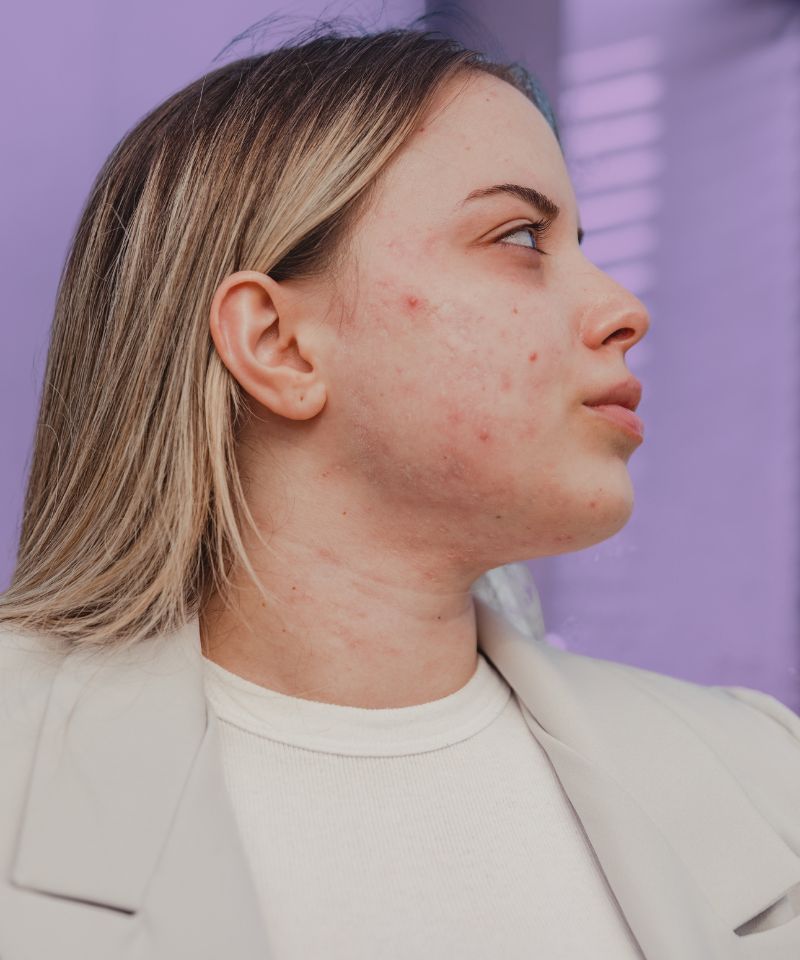PCOS is a hormonal condition that affects millions of women in the world.
But besides its effect on women’s reproductive health, PCOS can also significantly impact skin health and is often behind inflammatory skin conditions such as acne.
Therefore, if you think your acne may be related to PCOS, here’s everything you need to know about managing and treating it.

What is PCOS?
Polycystic ovary syndrome, or PCOS, is a condition that occurs when women’s ovaries produce higher-than-normal amounts of male hormones or androgens.
We all need these hormones, and in women, they serve a purpose in helping regulate the menstrual cycle.
However, when they’re produced in excess, it can lead to a range of symptoms, including irregular periods, difficulties to conceive, fatigue, and weight gain, to name a few.
Additionally, high androgen levels related to PCOS can also cause a range of physical changes.
The exact cause of PCOS remains unknown, but factors like genetics and insulin resistance (a condition where your body doesn’t respond well to insulin, which leads to higher blood sugar levels) play a significant role in its development.
PCOS and Its Effect on the Skin

PCOS can lead to several skin-related issues, not just due to the hormonal imbalances it causes but also as a result of insulin resistance, inflammation, and other factors associated with the syndrome.
Hirsutism (Excessive Hair Growth)
Hirsutism, or excessive hair growth in areas where men typically grow hair (face, chest, back), affects a significant number of women with PCOS.
This condition is directly related to elevated androgen levels, which stimulate the hair follicles to produce more and thicker hair.
This symptom not only has physical implications but can also lead to significant psychological distress.
Acanthosis Nigricans (Dark, Thick Patches on the Skin)
Acanthosis nigricans is characterized by dark, velvety skin patches that typically appear in the folds and creases of the body, such as the neck, underarms, and groin.
This condition is strongly linked to insulin resistance—a common issue in PCOS.
High insulin levels can drive the growth of skin cells, leading to the characteristic patches of acanthosis nigricans.
Furthermore, the condition is often considered a warning sign for diabetes.
Seborrheic Dermatitis
While not as commonly discussed symptom of PCOS, seborrheic dermatitis—an inflammatory skin condition causing red, scaly, and itchy patches on the scalp and nape of neck—can also be more prevalent in those suffering from this condition.
The exact link between PCOS and seborrheic dermatitis isn’t fully understood, but it may relate to hormonal imbalances affecting the skin’s oil production, leading to an overgrowth of yeast that naturally lives on the skin but feeds on our oil and causes inflammation.
Skin Tags
Skin tags, small flesh-colored or slightly pigmented growths on the skin, often occur in areas where skin rubs together, such as the neck, armpits, and groin.
Like acanthosis nigricans, skin tags in PCOS are associated with insulin resistance.
High insulin levels promote the growth of skin cells, leading to the development of skin tags.
Does PCOS Cause Acne?
Acne is an inflammatory skin condition most commonly associated with PCOS and backed by substantial scientific research.
The link between PCOS and acne can be attributed to hormonal imbalances, particularly high levels of androgens.
Androgens are hormones that directly stimulate the oil glands in the skin, leading to excess sebum production.
However, since sebum passes through the pores, excessive amounts can block these tiny passages.
The sebum then oxidizes and hardens inside the pores and forms a plug due to mixing with dead skin cells, which are also on their way out of the pores.
This hardened plug of cellular debris now creates an airless environment in which a particular strain of bacteria that live on our skin needs to proliferate.
However, after some time of proliferating inside the pores, the immune system detects this overgrowth of bacteria as a threat and initiates an immune response by sending white blood cells to the area to fight the invader.
This “fight” between bacteria and the immune system leads to inflammation, causing symptoms of acne such as redness, swelling, and pus.
Additionally, besides the abnormally high amount of androgens being one part of the hormonal imbalances, PCOS can also lead to elevated levels of insulin, which has been linked to acne development as well.
Insulin can cause inflammation in the body, which can aggravate acne symptoms.
Acne caused by PCOS typically appears on the lower face, jawline, and sometimes on the chest and back.
Managing PCOS-Related Acne

Effectively managing PCOS-related acne involves a multifaceted approach that addresses both the hormonal imbalances at the core of the condition and the symptoms manifesting on the skin.
Here are detailed strategies to consider:
Lifestyle Modifications
Diet and Exercise
A balanced diet rich in whole foods and low in processed, sugary, and high-glycemic-index foods can help manage insulin levels and reduce inflammation, both of which are beneficial for controlling PCOS symptoms, including acne.
Here are some foods to consider including in your daily menu if you are battling PCOS-induced acne:
- Lean Protein: Chicken, fish, tofu, and legumes can help balance blood sugar levels.
- High-Fiber Foods: Fruits, vegetables, and whole grains can slow down the absorption of sugars into the bloodstream.
- Healthy Fats: Avocados, nuts, and olive oil can help regulate hormones.
- Antioxidants: Berries, leafy greens, and green tea can reduce inflammation.
- Foods Rich in Omega-3 Fatty Acids: Salmon, sardines, and chia seeds can help promote the production of ceramides and improve the skin barrier’s function.
Weight Management
Achieving and maintaining a healthy weight can significantly impact hormone regulation and decrease the negative symptoms of PCOS.
Weight loss has been shown to improve the balance of hormones, reduce insulin resistance, and promote increased circulation, encouraging nutrient and oxygen delivery to the skin and improving its health and appearance from the inside out.
Medical Treatments
Hormonal Therapy
Birth control pills have been a popular PCOS maintenance option for a long time, as they contain both estrogen and progestin (female hormones), which can help regulate menstrual cycles, reduce androgen levels, and consequently decrease the severity of acne.
However, birth control pills can deplete the body of essential nutrients, including selenium and zinc, which are crucial for skin health.
Therefore, while it is an option that can be helpful for some women experiencing PCOS-related acne, it can be a double-edged sword, which is why it shouldn’t be a first-line treatment.
Additionally, spironolactone is another popular option that works by blocking androgens’ effects on the skin, leading to reduced oil production.
However, similarly to birth control pills, spironolactone can also cause nutrient deficiencies, which can trigger a whole new set of unwanted symptoms.
Therefore, while hormonal therapy might be tempting due to its promise that it works faster than natural routes, it requires a tailored approach and careful monitoring to avoid further imbalances and potential side effects.
Alternative and Complementary Therapies
Some individuals with PCOS find relief from acne through alternative therapies.
However, it’s important to note that these are not approved methods of PCOS treatment, but they are more natural and less invasive options that may provide relief to some individuals without causing significant side effects.
Here are some complementary therapies that may be worth considering:
- Spearmint Tea: Some studies have shown that drinking spearmint tea daily can help lower androgen levels in women with PCOS.
- Acupuncture: Some research suggests acupuncture may help regulate hormone levels in women with PCOS, though more research is needed to confirm its effectiveness.
- Zinc Supplementation: Zinc is an essential mineral for skin health and immune function that can help lower inflammation in the body, thus potentially improving inflammatory skin conditions such as acne.
Skincare Routine
Topical treatments can be a crucial component of managing acne in PCOS.
They are applied directly to the skin and can help manage the symptoms externally, including minimizing the severity of existing acne, preventing new lesions from forming, and reducing the risk of scarring.
Here are some topical treatments that may help improve PCOS-related acne:
Retinoids
Topical retinoids are effective in treating acne by promoting cellular turnover and preventing the clogging of hair follicles.
Additionally, due to their ability to stimulate collagen production, retinoids can help improve the appearance of acne scarring, including atrophic scars left by severe acne.
Benzoyl Peroxide
Benzoyl peroxide is an antibacterial component that infuses the pores with oxygen, thus destroying the airless environment bacteria need to survive.
This can help reduce inflammation and clogging and soothe active acne while preventing new breakouts from forming down the line.
Benzoyl peroxide can be used in a wash-off or leave-on form; however, it can be drying and irritating to sensitive skin, so it’s essential to start with a low concentration and minimal frequency of application.
Salicylic Acid
Salicylic acid is an oil-soluble beta-hydroxy acid (BHA) that penetrates deep into the pores to dissolve the plugs made up of cellular debris and unclog these passages to reduce bacterial overgrowth.
This action will help soothe active acne, redness, and inflammation, and by continuing to incorporate salicylic acid into your skincare routine regularly, you can also prevent new acne lesions from forming down the line.

My name is Simone and I am a certified skin specialist. I created this website to teach my readers how to take great care of their skin and I also like to occasionally share my honest opinions on skincare products I’ve tried. You can learn more about me here.
